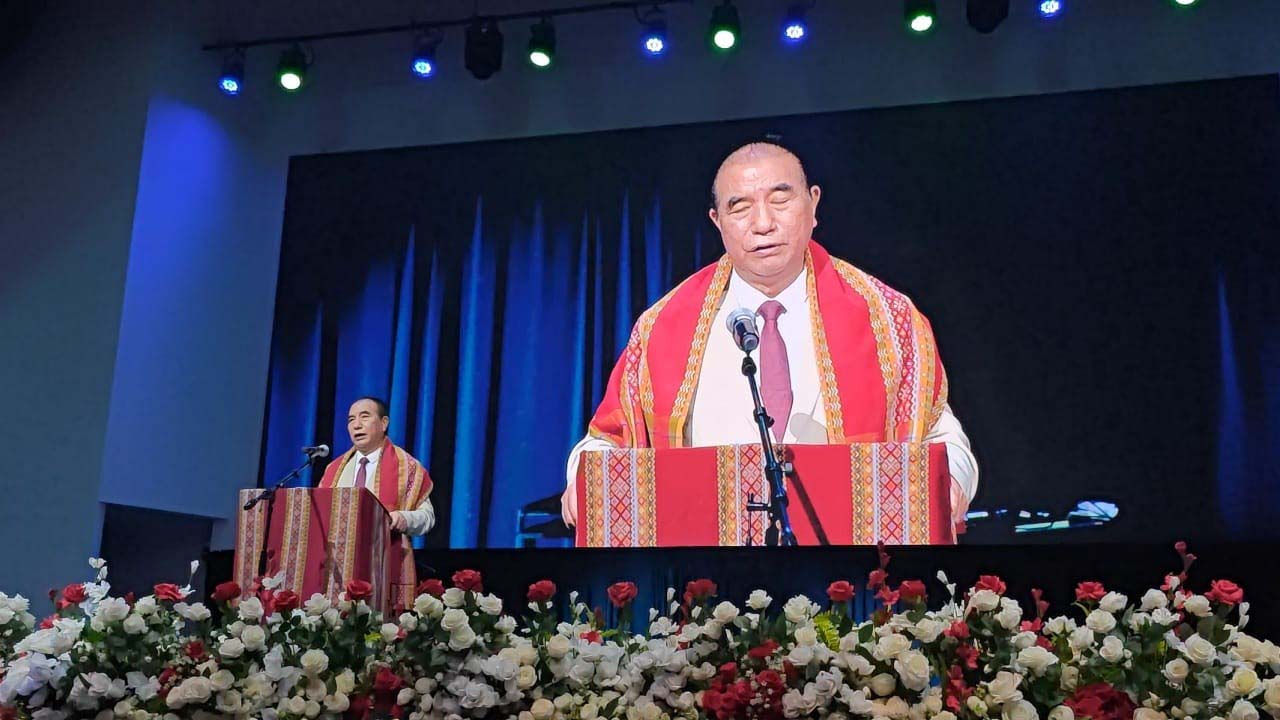The Meiteis mainly inhabit the Manipur valley, which constitutes about 10 percent of the entire state’s area. They have been claiming that they face difficulty in view of the large-scale illegal immigration of Myanmarese and Bangladeshi nationals in the hills of Manipur. They are also prevented from settling in the hill areas as per the Manipur Land Revenue and Land Reforms Act, 1960(MLR & LR Act). There have been popular demands to amend the existing land laws to do away with the land apartheid regime. The SCHEDULED TRIBE DEMAND COMMITTEE OF MANIPUR has been continuously demanding for the inclusion of Meiteis in Scheduled Tribes list. On April 19, 2023 the Manipur High Court issued a directive to the government to consider the request of the community for its inclusion in the reserved category within four weeks and send a recommendation to the Union government for its consideration. There are also popular demands for implementation of a National Register of Citizenship (NRC) based on the model of Assam to identify and deport foreign nationals especially those who have illegally settled in Manipur from Bangladesh and Myanmar.
Thereafter on May 3, 2023, a Peace solidarity rally organized by the All Tribal Student Union Manipur (ATSUM) was staged at various places including Churachandpur, Tamenglong, Tengnoupal, Senapati, Kangpokpi and Chandel districts of Manipur against the High Court directives. Large number of people joined the rally at Churachandpur district turning the situation into violent after some protestors burnt the office of the Forest Beat Officer at Bungmual, in Singhat Constituency. The protest at Kangpokpi district also turn violent after the protestors vandalized and pulled down the poster of Hun-Thadou Cultural Festival, 2023 held from April 18 to 19, 2023 at Thomas Ground, Kangpokpi district head quarter – with photos of Chief Minister N. Biren Singh. The violence between Meiteis and Chin-Kuki-Zo has so far displaced over 60,000 people, and led to the loss of around 300 precious lives from both communities. Displaced citizens are taking shelter at various make-shift relief camps.
Manipur has been burning for the last 18 months. But what seems to likely put more fuel to this violence is the speech made by the CM of Mizoram, Lalduhoma on September 4, 2024 at the Town Hall Meeting, Chin Community of Indianapolis organized by the Chin Evangelical Baptist Church in the USA while addressing a gathering at USA, where he declared – “We cannot fight three bigger ENEMIES at the same time.
We cannot fight India!
We cannot fight Bangladesh!
We cannot fight Myanmar”
Further, at the end of his speech, he continued to state, “As I approach the end of my speech, I want to let everyone here know that the primary reason I accepted the invitation to visit the United States is to seek a path towards unity for all of us. We are one people –brothers and sisters – and we cannot afford to be divided or apart from one another. I want us to have the conviction and confidence that one day, through the strength of God, who made us a nation; we will rise together under one leadership to achieve our destiny of nationhood. While a country may have borders, a true nation transcends such limitations. We have been unjustly divided, forced to exist under three different governments in three different countries, and this is something we can never accept.”
The speech went viral on social media when Goa Chronicle’s Founder and Editor-in- chief, Savio Rodrigues wrote the article, “Mizoram CM Lalduhoma’s Call for Nationhood in the US: A Separatist Agenda to Divide Northeast India?”
The question here is how can a CM of a state who has taken oath under the Constitution of India to uphold the sovereignty and integrity of the country, calls for a nationhood in a foreign country. Why is the Government of India silent over his speech? Is this the agenda to break North-east India including Manipur, where the Chin-Kuki-Zo community have been demanding for a Separate Administration or a Union Territory like that of Puducherry? Does his speech not amount to sedition? These are questions that pose before the country.
The Bharatiya Nyaya Sanhita (BNS) Act, 2023 criminalizes acts of secession, armed rebellion, subversive activities, separatist activities or endangering the sovereignty or unity of India. BNS Section 150 deals with the offense of concealing a plan or intention to wage war against the Government of India. This includes any act or omission aimed at hiding such a design, with the intent to facilitate or knowing it is likely to facilitate the waging of war. The penalties under this section include imprisonment for up to ten years and a fine. BNS Section 152 criminalizes actions that purposefully or knowingly excite or attempt to excite secession, armed rebellion, subversive activities, or separatist sentiments, or otherwise endanger the sovereignty, unity, and integrity of India. The penalties under this section include imprisonment for life or imprisonment for up to seven years, along with a fine. Section 147 of the BNS Act penalises waging or attempting to wage wars or abetting waging of war against the Government of India.
Lalduhoma’s remarks have been interpreted by many as an endorsement of separatism, specifically calling for the formation of a unified Chin-Kuki-Zo nation, irrespective of national borders. His rhetoric, which calls for the creation of a single nation transcending national boundaries, raises critical concerns regarding his political ideology and its implications for India’s sovereignty and territorial integrity. His statements could be viewed as advocating for the secession of the Chin-Kuki-Zo communities of India’s north-eastern States, particularly Mizoram and Manipur. His secessionist speech thus potentially falls under the BNS Act, 2023. If his remarks are interpreted as incitement to rebellion or separatism, he could face severe legal consequences, including imprisonment and fines. Such a move could set a dangerous precedent, encouraging other ethnic or regional groups in the Northeast to demand similar autonomy or secession, potentially leading to greater fragmentation in the region. The call for a unified Chin-Kuki-Zo nation spanning India, Myanmar, and Bangladesh could incite separatist sentiments and undermine India’s territorial integrity. Given that the Bharatiya Nyaya Sanhita (BNS) Act, 2023 criminalises such acts of separatism, the speech may warrant legal scrutiny, though it remains to be seen whether the Indian government will take action. In the context of the ongoing violence and ethnic tensions in Manipur, it is essential that the Indian government take proactive steps to safeguard the unity and sovereignty of the country. As per the United Nations High Commissioner for Refugees (UNHCR) of the 83000 Myanmarese nationals taking refuge in India’s northeast, Mizoram hosts around 40000 and while the rest are taking shelter in Manipur. Civil society bodies of Kamjong district have complained that around 8000 Myanmarese nationals have infiltrated into its areas threatening the local resources and culture of local people. The alarming situation is the interference or involvement of these refugees into internal politics of ethnic identities. It is proven fact that in the ongoing Manipur violence Myanmarese Chin-Kuki-Zo communities are actively engaged in the offensives for their greater Zalengam. Given these realities it is high time that the GOI take these influxes of refugees seriously and implement NRC in Manipur with 1951 as the base year of identification of refugees. Such a step may calm down the sentiments of indigenous people of Manipur and may positively contribute towards restoring peace and harmonious co-existence in the State.

The writer is MA in History from IGNOU and can be reached at dianawareppam112@gmail.com












4 thoughts on “Mizoram Chief Minister Lalduhoma’s Speech: Manipur Crisis and India’s Integrity”
Documenting such facts are highly appreciated..
The current situation in Northeast India has become a topic of grave concern as citizens continue to suffer from anti-national elements threatening peace and stability. One prominent figure in this controversy is the Chief Minister of Mizoram, whose actions and decisions have raised questions about his role.
The Northeast has always been a region of rich culture, diversity, and resilience. However, its proximity to international borders and the influx of external influences have made it a hotspot for insurgencies, illegal activities, and political unrest. In this volatile environment, leaderships are need to plays a pivotal role in safeguarding the region’s integrity and ensuring the well-being of its citizens.
Great 👍👏👏👍work vy
Great work 👍
Keep up the good work
Comments are closed.